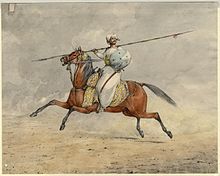Maratha Army
| Maratha Army | |
|---|---|

A painting depicting a Mahratta Light Horseman
|
|
| Active | circa 1650-1818 |
| Country | India |
| Allegiance | Maratha Empire |
| Type | Army |
| Size | Peak Size - Around 200,000 men (consisting of Infantry, Cavalry, Artillery, Musketeers, and Pindari (irregular horsemen) |
| Commanders | |
| Senapati | Commander in chief |
Maratha (or Mahratta) Army refers to the land-based armed forces of the Maratha Kingdom of India, which existed from the late 17th to the early 19th centuries in India. The formation, rise, and decline of the armies of the Maratha Kingdom can be broadly divided into two eras
Chhatrapati Shivaji, the founder of Mahratta polity, raised a small yet effective land army. For better administration, Shivaji abolished the land-grants or jagirs for military officers and made a cash payment. During the 17th century the Maratha Army was small in terms of numbers when compared to the Mughals, numbering some 100,000. Back then, it consisted of mainly cavalry and infantry. Shivaji gave more emphasis to infantry as against cavalry, considering the rugged mountainous terrain he operated in. Further, Shivaji did not have access to the North Indian horse trading market, dominated by the Mughals. During this era, the armies of the Marathas were known for their agility due to the light equipment of both infantry and cavalry. Probably due to the rugged terrain, artillery was not given much emphasis. Artillery was mostly confined to the Maratha fortresses, which were located on hilltops, since it gave a strategic advantage and further these fortresses had abilities to withstand sieges (such as being equipped with sufficient water supply). The Marathas used weapons like muskets, matchlocks, swords, clubs, bows, spears, daggers, etc.
The Maratha Army, during Shivaji's era was systematic and disciplined. It probably possessed infantry and artillery capability equivalent to the European standards. A case in point here is that the Marathas achieved success in systematic elimination of all forts which came their way during the Battle of Surat circa 1664. Regards the artillery, Shivaji hired foreign (mainly Portuguese) mercenaries for assistance to manufacture weapons. The hiring of foreign mercenaries was not new to the Maratha military culture. Shivaji hired seasoned cannon-casting Portuguese technicians from Goa. The Marathas attached importance to hiring of experts, which can be corroborated by the fact that important posts in the army were offered to the officers in charge of the manufacture of guns.
...
Wikipedia
